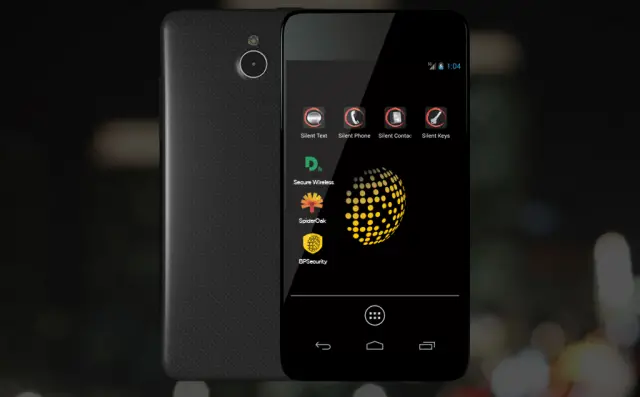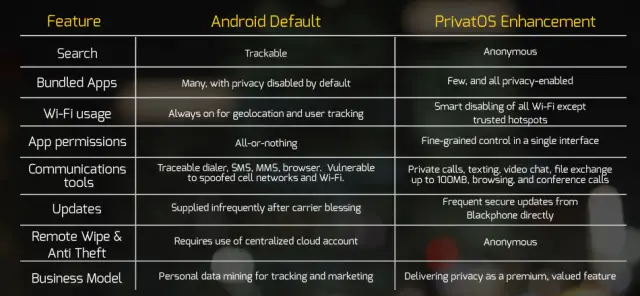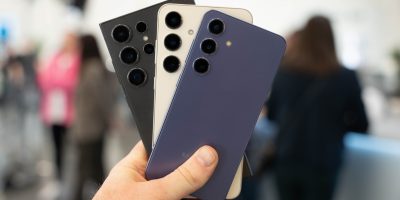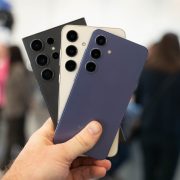Remember GeekPhone? In the early days of Android – 2009 to be exact – the Spanish company captivated hardcore Android enthusiasts with a device called the GeekPhone One. Seems like a different century: that device ran Android 1.5 and had a 3.2-inch resistive screen. Though they never reached critical mass, the Geekphone team is still at it, now teaming up with security firm Secure Circle to produce the Blackphone.

Some quick Blackphone specs:
- 4.7-inch HD screen
- 2GHz Quad-core processor
- 16GB of memory
- 8MP camera
- Android 4.4
The Blackphone is a tough competitor when you place it against today’s upper midrange Android devices, suffice to say the specs aren’t what make the Blackphone “the Blackphone”. Dubbed with a name not unlike the strong, sturdy, unbreakable box found on airplanes, the Blackphone exists to be the most secure and privacy protected smartphone known to man.
How does the Blackphone keep you safe?
The Blackphone is a highly customized version of Android, locking down system level implementations as well as applications and stacks that sit above the operating system. At its core, Blackphone offers the following Secure Circle services:
- Silent Phone: Secure and encrypted VoIP
- Silent Text: Secure and encrypted text messaging
- Silent Contacts: protects your phone from apps trying to read your contact list
Pretty interesting offers for folks especially concerned about the security of their data and privacy, but you don’t need the Blackphone for these, they’re already available as paid apps on iOS and Android. With the Blackphone you do get a 2-year subscription, but then you’ve got another problem: these apps are only secure when both users have a Blackphone and/or these Secure Circle apps.
To remedy this limitation, Secure Circle is giving Blackphone customers 3 invites for 1-year subscriptions to these services, presumably for the family and friends you call the most. Supposing you like the service, though, they’ll be left in the dust on that second year and have to pay for the service themselves.
PrivatOS vs Android
From one standpoint, you could consider the Blackphone as a marketing tool to gain better visibility for their Secure Circle apps. That being said, just as rooted Android Phones are able to accomplish more than non-rooted phones, the Blackphone has some capabilities that simply downloading the relating apps can’t offer.

The Blackphone has a number of other incorporated services through various partnerships, outlined extensively by The Verge, but two additional services are of particular interest:
- Security Center: allows users to enable/disable specific app permissions on an app-by-app basis after download
- Ad Blocker: prevents ad tracking code found in certain apps from tracking personally identifiable information and data
Because most of the nefarious activity happening on Android phones comes directly from rogue apps, Security Center and Ad Blocker – in my opinion – should be the two biggest draws from consumers looking for a secure solution.
The Blackphone is now available for pre-order at $629 and the company hopes, within three years, to be selling $60 Million in phones each year.
Blackphone or Wackphone?
The debate on privacy and data security often has two camps:
- The paranoid on one side and the people who aren’t breaking the law so don’t care on the other
- The responsible people who value their freedom on the one side and the ignorant on the other
It’s all a matter of perspective, but given recent data breaches that have exposed millions of credit card numbers and social security numbers, there are a growing number of citizens who are concerned with securing their information. Unfortunately, not many people actually know how to do this. The Blackphone could be one fool-proof plug-and-play style option.
Is the Blackphone up your alley? Do you think it’s a waste of time capitalizing on people’s fears? Or maybe you already accomplish a bunch of this stuff with a rooted Android device and a mixture of your own favorite apps?











Pretty nice looking hardware – why not just be “normal”
This project is too niche in my opinion
Agreed… but as a marketing ploy to further promote their software it might not be a bad idea. Or maybe they’re trying to get government contracts.
Geeksphone always had nice looking hardware but never get it out on time or as promised from what I recall.
We have OpenBSD for the security-conscious desktop and business users. Why not a secure Android?
Forget about “not breaking the law, nothing to hide.” Check out the “Network Connections” app. What your apps may be sending back to their developers just might surprise you.
If this works, I won’t see their approach as a marketing ploy at all.
I root, monitor and block selectively. Root is required. The non-rooted apps cannot do as much despite any marketing claims.
It’s a pain in the neck and root is not for everyone.
IKR!?
Example being, I don’t have anything to hide in my emails and text messages, but I would rather people not knowing when my packages are arriving.
I’ll give you a really shocking example.
A popular file explorer that I trusted for years added Dropbox support.
Great says I and gave it a go. Login page would not render. I emailed the devs and they said – “You’re using an ad-blocker, turn it off.”
Suspicious, I turned off ad-blocking and tried again.
The page rendered.
And Network Connections showed that my Dropbox login was first going through the dev’s server in China. So then I examined my network traffic with a packet sniffer. The password page was coming from their server, not Dropbox, and that’s why it was suppressed by my ad-blocker.
I let them know that I was going to expose them publicly in no uncertain terms.
“Sorry, must be a bug, try again. Update from Play Store.”
They not only fixed it but the no-ad-blocking requirement went away.
I still don’t use that app for Dropbox because I don’t know when they’re going to slip something else in.
I think the time for a user-secured Android is well at hand.
What’s the name of the app? It should be hit with one star reviews or removed from the Play Store. Why not expose such a poor developer?
Because in the end, they did fix it.
But because you asked, it was EStrongs File Explorer.
I still use it, just with caution.
Believe me, they aren’t the only ones trying that sort of thing.
Was it a bug? I don’t know. But it wasn’t ok.
Is that the same thing as ES File Explorer? I know they fixed the issue but I question if its safe if they were low enough to do that with PayPal…
The same.
This is one area where iOS has a strong lead over Android. On iOS you can block access to contacts, photos, GPS, etc… on Android it’s wide open by default. I agree Android needs better privacy features.
People don’t have knowledge of everything. Some people truly don’t know how to use their phones and won’t take the time to learn. Not that it’s a bad thing, they’re just busy learning other things.
So why not let your phone keep it private for you? You can learn how to block all that stuff on your own, or pay for someone else’s service. I think the Blackphone is a good phone for those that want privacy, from what I’ve read about it.
It’s a tempting device. I just think all the data mining apps I unknowingly use on my phone will be useless on this device as they’ll be blocked.
Back to my ‘free’ mobile games and social networks, paying with my data.
The biggest possible market I see for these is businesses that previously used BlackBerry because of the security.
Because someone expects privacy which should be a given they are automatically nuts? You’re a douchebag rob.
Where did he say that?
”
PrivatOS Blackphone protects privacy nuts for $629, aims for $60M in sales”
Two things:
(1) “Nut” wasn’t meant in a derogatory fashion. I’d consider myself a sports nut, tech nut, etc…
(2) I didn’t say someone expecting privacy is a nut. Even if you were to take “Nut” out of context given my intentions, there are still levels of nuts. I think expecting privacy and being secure with your information is great… but some people take it lightyears too far. Saying even this type of “nut” who takes it too far will appreciate this phone… is another way of looking at it.
If you think “nut” is derogatory and also classify yourself as a nut and take offense to the title… not much I can do. Sorry. But hopefully that clarifies things a little.
Also, to be fair, I’m a douchenut, not a douchebag. Get it right.
Rob motherfuckin’ Jackson, ladies and gents.
Definitely a market for this phone. I work for a managed IT firm and the clients that my team and I support are very focused on security. I just had a conference call with one of them not a week ago when they told me I am not to judge their paranoia, only to provide an answer to their security concerns. I think I may just pass this little device along for them to check out.
Glad I got to read more about this, saw an article on it a few weeks back that was very vague. Thanks, Rob.
Maybe there is a lot more to it that is not being readily advertised but, I don’t really see anything on this feature list that I couldn’t do with a CM11 install on most phones. Using Spideroak, droidwall, whisperpush, wickr, App Ops etc I get all of these same features and on any hardware handset that Cyanogenmod supports. From a security perspective I would put my phone with slimkat on it up against anything done commerically.
I roll my own as well.
I think you have the comparison backwards though.
Would you put this up against your installation and recommend it for those who can’t root (and there are a lot of valid reasons for that)?
If root is unattainable for someone, I think they deserve a worthy commercial implementation that can do what you and I have done.
I think you are totally right. I was thinking for myself, but for the average consumer this might be a good option. The only problem though is, depending on how average they are the app permissions thing is going to ruin their experience. If location is toggled off in Facebook they won’t know to toggle it on temporarily if they want to check in somewhere they will just assume the GPS doesn’t work or something. I’ve never seen the interface for that stuff on this phone so maybe they’ve made it pop up and say “facebook would like to use your location (fine) do you want to allow for the next 10 mins?” or something cool like that.